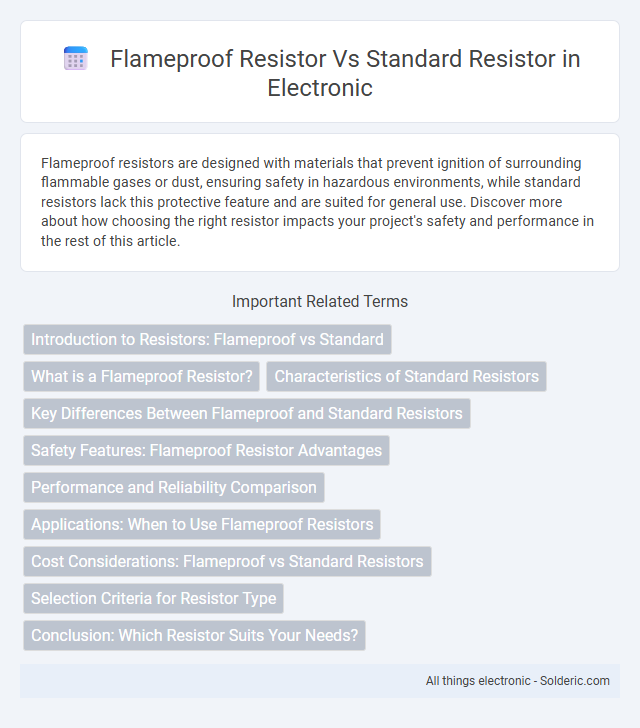Flameproof resistors are designed with materials that prevent ignition of surrounding flammable gases or dust, ensuring safety in hazardous environments, while standard resistors lack this protective feature and are suited for general use. Discover more about how choosing the right resistor impacts your project's safety and performance in the rest of this article.
Comparison Table
| Feature | Flameproof Resistor | Standard Resistor |
|---|---|---|
| Safety | Designed to prevent ignition of flammable gases; flame-retardant casing | No special flameproof features; may emit sparks or smoke under fault |
| Operating Environment | Suitable for hazardous, explosive environments (ATEX, IECEx certified) | Used in general electrical and electronic applications |
| Construction | Robust, insulated materials with flame-resistant coating | Standard materials, typically carbon film, metal oxide, or wire-wound |
| Cost | Higher cost due to enhanced safety features and certifications | Lower cost with basic construction |
| Performance | Reliable under overload conditions with controlled failure mode | May fail unpredictably under overload or short circuit |
| Applications | Oil, gas, chemical plants, mining, hazardous locations | Consumer electronics, general circuits, low-risk environments |
Introduction to Resistors: Flameproof vs Standard
Flameproof resistors are designed with a special coating and construction to prevent fire hazards by containing any sparks or heat generated during operation, making them ideal for safety-critical environments. Standard resistors lack this protective feature and are typically used in general-purpose applications where flame resistance is not a priority. Choosing the right resistor involves understanding your circuit's safety requirements and whether flameproof protection is necessary to minimize fire risk.
What is a Flameproof Resistor?
A flameproof resistor is a specialized electronic component designed to withstand high temperatures and prevent ignition in hazardous environments by safely dissipating energy without catching fire. It features a robust construction with flame-retardant materials and protective coatings that ensure reliable performance under overload or short-circuit conditions. Unlike standard resistors, flameproof resistors are critical in explosive atmospheres such as oil refineries and chemical plants to enhance safety and compliance with stringent industry standards.
Characteristics of Standard Resistors
Standard resistors exhibit consistent resistance values with tolerance levels typically ranging from +-1% to +-10%, making them suitable for general electronic circuits. They operate effectively within moderate temperature ranges and standard power ratings, usually below 0.5 watts, without specialized protection against environmental hazards. Your choice of a standard resistor is ideal for low-risk applications where flame resistance and enhanced safety features are not critical.
Key Differences Between Flameproof and Standard Resistors
Flameproof resistors are designed with flame-retardant materials and encapsulated coatings to prevent ignition during overheating or electrical failure, whereas standard resistors lack such protective features. Flameproof resistors typically exhibit higher durability, enhanced thermal stability, and improved safety ratings, making them suitable for hazardous environments. Standard resistors prioritize general electrical performance without specialized protection against fire hazards, limiting their use in high-risk or explosive atmospheres.
Safety Features: Flameproof Resistor Advantages
Flameproof resistors are designed with robust safety features that prevent combustion under overload or fault conditions, making them ideal for hazardous environments where fire risks must be minimized. Their construction typically includes flame-retardant materials and encapsulation techniques that contain heat and sparks, significantly reducing the chance of ignition compared to standard resistors. These advantages ensure enhanced operational reliability and compliance with stringent safety standards in industrial and explosive atmospheres.
Performance and Reliability Comparison
Flameproof resistors are designed to withstand extreme conditions such as high temperatures and electrical surges, ensuring enhanced performance and preventing ignition in hazardous environments. Standard resistors typically offer reliable operation in conventional circuits but lack the robust protective features found in flameproof variants. You gain superior reliability and safety in critical applications by choosing flameproof resistors over standard types.
Applications: When to Use Flameproof Resistors
Flameproof resistors are ideal for applications requiring enhanced safety and reliability in hazardous environments, such as in explosive atmospheres found in chemical plants, oil refineries, and gas extraction facilities. Standard resistors suit general electronic circuits where risk of fire or explosion is minimal, commonly used in consumer electronics, computers, and everyday appliances. You should choose flameproof resistors when your application demands strict adherence to safety standards like IEC or ATEX to prevent ignition of flammable gases or dust.
Cost Considerations: Flameproof vs Standard Resistors
Flameproof resistors typically incur higher costs compared to standard resistors due to their specialized construction designed to withstand and contain combustion or excessive heat. Materials such as ceramic or metal oxides and rigorous testing standards contribute to increased manufacturing expenses. While standard resistors offer a cost-efficient solution for general applications, flameproof resistors are essential for safety-critical environments where fire risk mitigation justifies the premium price.
Selection Criteria for Resistor Type
Flameproof resistors are selected over standard resistors in applications where high safety and reliability under extreme conditions are required, such as in explosive atmospheres or high-temperature environments. Key criteria for selection include power dissipation capacity, thermal stability, flame retardant properties, and compliance with industry safety standards like IEC or UL. Standard resistors are chosen for general-purpose use where these stringent safety factors are not critical, focusing instead on cost-effectiveness and availability.
Conclusion: Which Resistor Suits Your Needs?
Flameproof resistors offer enhanced safety by preventing ignition in hazardous environments, making them ideal for applications requiring high reliability under extreme conditions. Standard resistors provide cost-effective solutions for general-purpose circuits but lack the protective features essential for explosive atmospheres. You should choose a flameproof resistor when safety and compliance with strict industry standards are priorities; otherwise, a standard resistor may suffice for everyday electronic projects.
Flameproof resistor vs standard resistor Infographic

 solderic.com
solderic.com